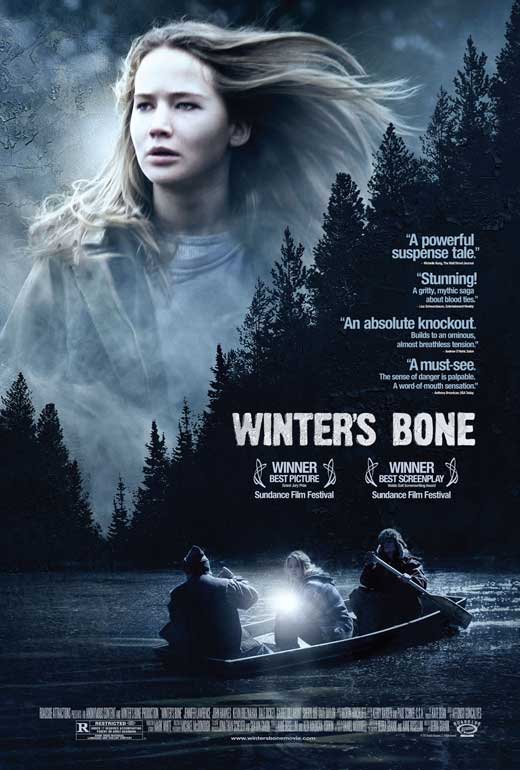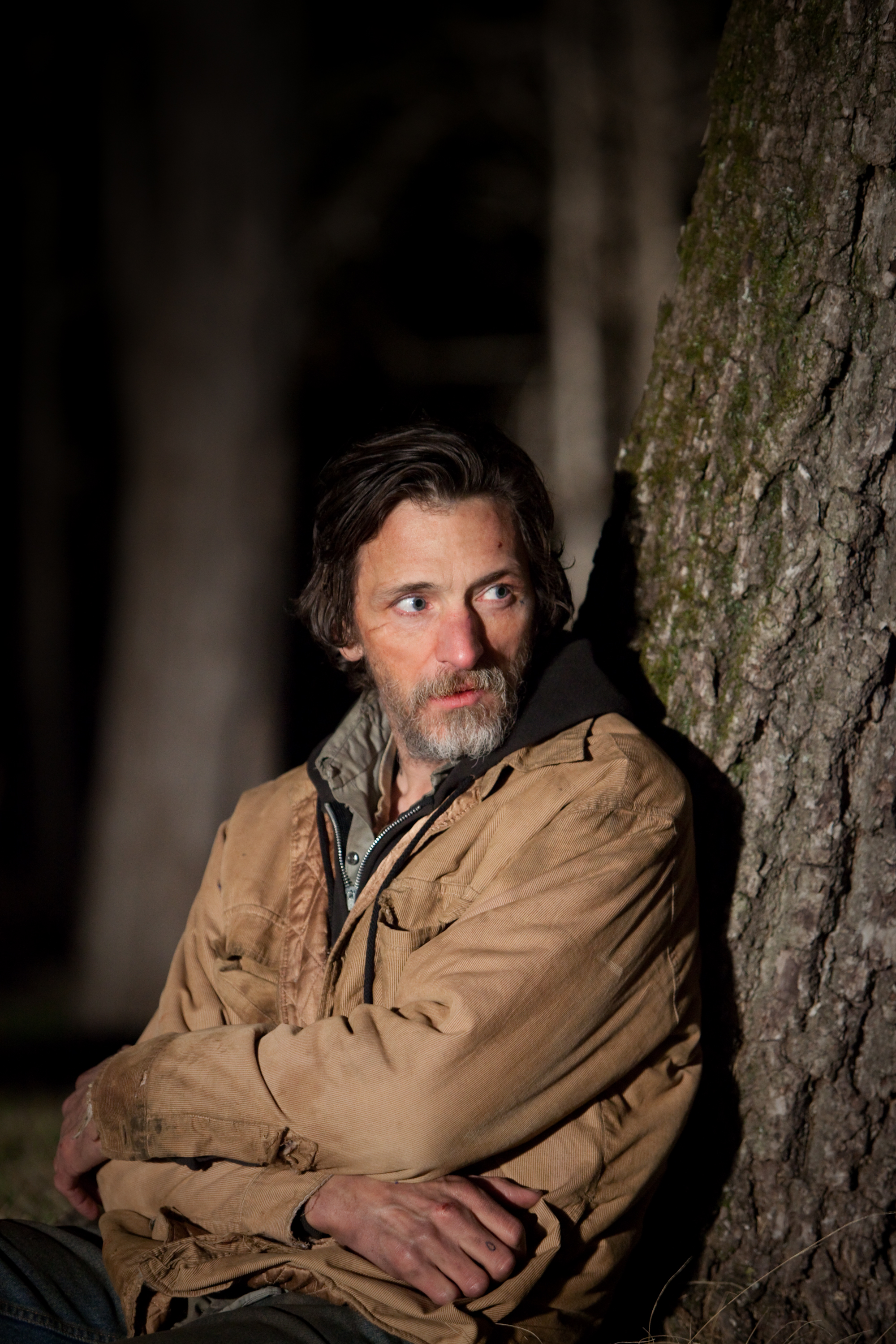

Director: Debra Granik, 2010. (R)
Winter's Bone is a cold, dark, wintry movie filled with brooding intensity that some may find slow but which grips the viewer despite its pace. Described as Southern Gothic and country noir, it combines aspects of both to create a film that explores a number of themes, including courage, family, loyalty and violence amidst the white trash poor of Missouri.
Set in the Ozark back country, Ree Dolly (Jennifer Lawrence) is a 17 year-old with the weight of her family on her thin shoulders. With an absent father and a catatonic mother, Ree has to care for her two younger siblings, Sonny and Ashlee as well as her mom. When the local sheriff stops by to give her some bad news, her already dismal situation turns almost hopeless. Although she already knows that her criminal father has disappeared, she now finds out that he has put their house up as collateral on his bond and jumped bail. If he does not show up for his court date in a week they will lose the house and property, leaving them homeless and abandoned.
 Setting out alone, without even a vehicle, Ree begins her quest to find her father. As a meth cooker, he has few friends in the underworld of the crystal methamphetamine subculture. But as she begins asking around, it seems everyone wants her to shut up and stop messing in their business. It is an ugly world with violence threatening at evey turn.
Setting out alone, without even a vehicle, Ree begins her quest to find her father. As a meth cooker, he has few friends in the underworld of the crystal methamphetamine subculture. But as she begins asking around, it seems everyone wants her to shut up and stop messing in their business. It is an ugly world with violence threatening at evey turn.An early scene highlights this undercurrent of violence. Ree walks across fields to come to the home of her relatives. While her aunt offers warm words and hot tea, her uncle Teardrop (John Hawkes) enters the room. Himself a crystal coke addict, he swiftly grabs her by the throat, and we don't know if he will harm her or help her. Such is the menacing nature of life for Ree.
 Already a winner of numerous awards, including the Grand Jury Prize at the Sundance Film Festival, this low-budget ($2 million) independent movie will likely pick up some Oscar nominations. Its greatness centers on these two characters played with outstanding performances by two unknown actors. Lawrence communicates the gritty determination of a teen who has to rise to face demons that would scare those twice her age. In almost every scene, she is the heart and soul of the movie. Hawkes, on the other hand, has a tougher role. He has to balance the twitchy violence of a drug user with the twinges of familial love for his brother's family. And he does so in a believable fashion. Putting himself in harm's way he demonstrates loyalty when others would back off.
Already a winner of numerous awards, including the Grand Jury Prize at the Sundance Film Festival, this low-budget ($2 million) independent movie will likely pick up some Oscar nominations. Its greatness centers on these two characters played with outstanding performances by two unknown actors. Lawrence communicates the gritty determination of a teen who has to rise to face demons that would scare those twice her age. In almost every scene, she is the heart and soul of the movie. Hawkes, on the other hand, has a tougher role. He has to balance the twitchy violence of a drug user with the twinges of familial love for his brother's family. And he does so in a believable fashion. Putting himself in harm's way he demonstrates loyalty when others would back off. Writer-director Granik populates the rest of the cast with uniformly ugly actors. Nowhere to be seen are the Hollywood pretty people. They have no place in this redneck country. Moreover, she fills the frames of the film with cold winter scenes, bare branches, frigid rivers, beautiful sombre scenery. And as taut as her story is, she paces it effectively allowing us to feel the intensity and suspense that grips Ree. When violence comes, it is swift and painful, like life itself.
Ree wants to experience the normal life of a high schooler. We see her looking longingly in at such a life, at a classroom with students holding babies, and at an ROTC drill. She wants both, but can have neither.
But Ree gives us a picture of the scrappiness of the human spirit. Where others would give up, she keeps on going. Whether it is chopping wood to fuel the fire or hunting and skinning squirrels to feed the family, she is a fighter. Life may have stacked the deck against her and dealt her a losing hand, but she won't fold.
We should be like Ree. When we think of giving up or lamenting our lot in life, we can reflect on this teenage survivor. Her courage is a challenge to us. We can rise above whatever cycles of abuse, poverty, or the circumstance we find ourselves in. God will give us the power and courage if we call upon him (Psa. 46:1).
One poignant scene underscores her proud character. Watching her neighbor skin a deer her brother wants her to ask for some of the meat. She responds, "never ask for what ought to be offered." Though poor, she will not stoop to begging despite their hunger.
This scene causes us to reflect on our obligations to our neighbors. In this Christmas season, there are many around us who are hungry and homeless. Some may ask us directly for help; others may not. Yet those of us who are blessed with more than we really need should ponder our debt to them. Jesus said that when we give a cup of water to the thirsty we are serving him (Matt. 10:42, 25:35). Paul told us to have no debts except that of love (Rom. 13:8). We can serve Jesus by giving to those in need without being asked. Let our debt of love be partially paid through our sharing (2 Cor. 9:13).
As Ree's quest takes her deeper into the dangerous waters of the meth mafia, her two siblings think she will leave them. But her responsibilty to them is clear: "I'd be lost without the weight of you two on my back." Her sense of familial responsibility is a testament to us. She realized that pursuing a career would mean sacrificing them to a life with strangers. Teardrop, too, comes through when the rubber meets the violent Missouri road. Blood is thicker than water. We may feel burdened by our family, whether it is caring for siblings, children or even elderly parents. But they are family. We must deny them. Love in words is not enough. Love expects actions, demands nurture and protection (1 Cor. 13:7).
"Winter's Bone" is an odd title. Daniel Woodrell, the author of the book on which this film is based, considered that winter was throwing a sop, a bone, to Ree, a gift of sorts. The ending offers a bone to Ree, a glimmer of hope. But the movie's ambiguity, its sadness and its despair juxtaposed with this hope and ray of redemption, parallels life. We humans are not predictable. But even in our complexity, our hearts are not too cold to be warmed by this slight "Ree" of sunshine.
Copyright ©2010, Martin Baggs


No comments:
Post a Comment